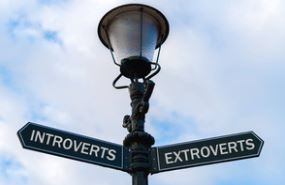You can imagine which of those is going to have an easier time in most jobs.
What does science say? Unfortunately, there is not a lot of science when it comes to something as subjective (and colloquialized) as being an extrovert. So a group of scholars writing in the Journal of Applied Psychology did a review of 91 meta-analyses relating to extroversion and work-related variables. The variable, 165 in total, include things like motivation, work-life balance, emotional well-being and performance. Supporting data was taken from studies across multiple countries, from different occupations and across different career moments including education, job application, and on the job evaluations.
The authors found that higher extroversion was desirable for 90 percent of variables, which suggests a small, persistent advantage in the workplace. However, it was in four categories that extroverts enjoy a distinct advantage; motivational, emotional, interpersonal and performance-related. They captured the strongest positive effects of extroversion at work.

Credit: Storyblocks.com
Extroversion is linked with a greater motivation to achieve positive goals - in this case as a desired reward through work. It's also closely associated with experiencing positive emotions more regularly. A happy employee is not only more satisfied with life, they also tend to work harder and are perceived as a better leader as a result. Positive emotions also act as a buffer against stress or adverse experiences at work.
Since extroverts like to be around other people, the third advantage has to do with socializing. By virtue of stronger communication skills, extroverts tend to adapt better to different social situations and are adept at persuasion, which is also a strong leadership skill.
The fourth advantage is in job performance. Past research that has found out of the big five personality traits, only conscientiousness and emotional stability generally predicted performance across different occupations, so why would extroverts excel? Likely from a combination of the three previous advantages. Motivation brings positivity and that can lead to better performance.
So what does this mean for introverts?
While it's generally advantageous to be extroverted, introverts shouldn't interpret these findings to suggest they will be at an inevitable disadvantage. Though science is done in groups, many scientists will self-designate themselves as introverts. But few people are one or the other, even if they give themselves a label. And there are also numerous other characteristics that contribute to workplace success, including cognitive ability, conscientiousness, and the ability to regulate negative emotions.
That leads to a limitation of the study; it only looked at extroversion and work-related variables. In computer programming, introverted characteristics like listening rather than talking or the ability to focus might be more beneficial. If you work remotely, but are intelligent, work hard and bring other things to the table, you're going to do well, which brings its own kind of popularity.





Comments